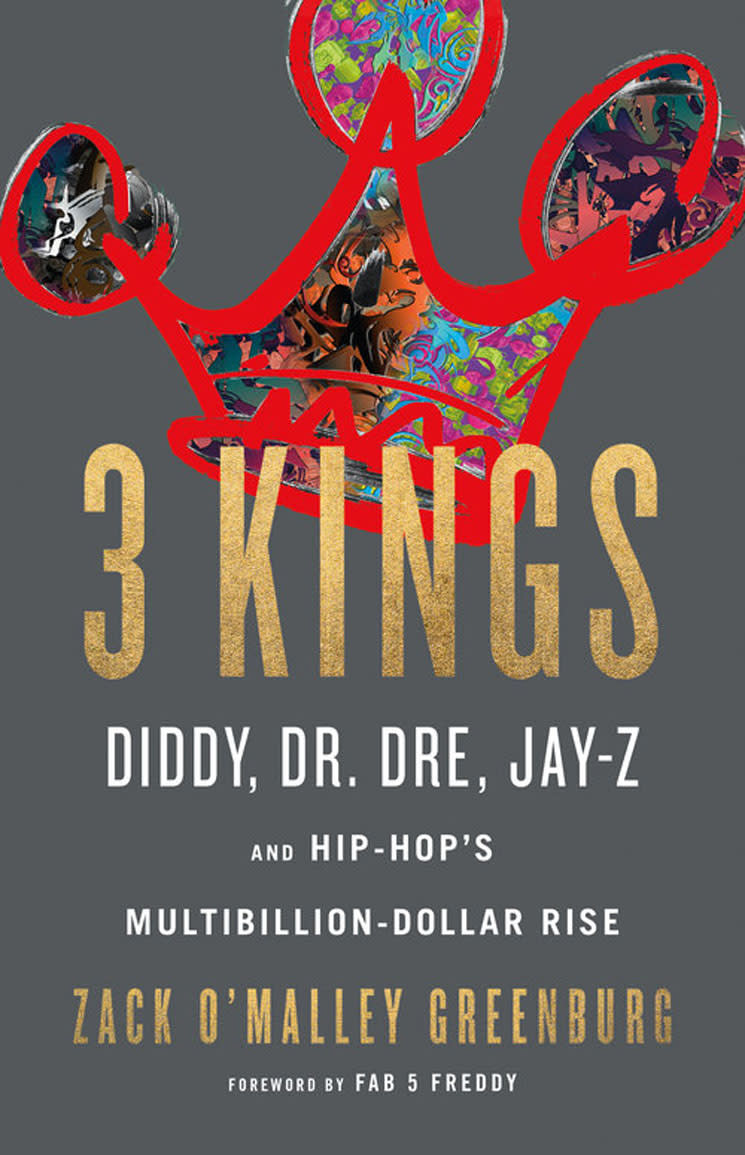Since 2007, American business magazine Forbes has chronicled the highest-paid acts in hip-hop. In the past decade, the names that grace the top of the list have seldom changed, with Jay-Z, Diddy and Dr. Dre leading the pack as the genre's cash kings. Together, their combined net worth is well over $2 billion USD.
Of course, it took much more than the success of their music for all three moguls to claim their places at the top. Jay-Z's vast investment portfolio includes a music streaming service, a sports management company, a clothing line and beverage brands. Diddy's name is synonymous with Cîroc vodka. Dr. Dre only grew richer in 2014 by selling his Beats By Dre headphone brand to Apple to the tune of $3 billion.
As Zack O'Malley Greenburg outlines in his 3 Kings: Diddy, Dr. Dre, Jay-Z and Hip-Hop's Multibillion-Dollar Rise, the accumulation of wealth by the trio of power players certainly wasn't something that happened overnight. Greenburg, a senior editor at Forbes who covers music, media and entertainment, charts the individual rise of his three subjects in the context of hip-hop at large, simultaneously shining a light on how the genre transformed from block parties into a multibillion-dollar industry.
A common thread between all three, as identified by Def Jam co-founder and businessman Russell Simmons in conversation with Greenburg, is that "They just said, 'Why don't I do it myself?'" The author writes of Jay-Z and Roc-A-Fella partner Damon Dash hauling sewing machines into their label office to stich together early prototypes for Rocawear after failing to reach an endorsement deal with European designer Iceberg.
Diddy was known to approve designs for his Sean Jean brand while jumping between songwriting and recording sessions with Bad Boy artists, with the juggling act leading him to become the first black person to win the Council of Fashion Designers of America's Top Menswear Designer of the Year award in 2004. Dre's self-starter tendencies led him to founding record label Aftermath in 1996, after distancing himself from Suge Knight and Death Row Records. He became an in-demand producer for the likes of Eminem, Mary J. Blige, Gwen Stefani and more, with Aftermath being worth over $100 million by 2001.
Greenburg also takes out a chapter to float the idea of 50 Cent as a fourth Cash King, branching out from a successful music career (in which he crossed paths with Dre), to success with Vitaminwater in the beverage industry, to his recent filing for bankruptcy. Adjacent nods are also given to Simmons and his fashion work with Phat Farm, and Kasseem "Swizz Beatz" Dean for his role as global creative director for Bacardi.
Having written books about the financial rise of both Jay-Z and Michael Jackson prior to 3 Kings, Greenburg is an old hand at laying out numbers and entrepreneurial concepts in perfectly digestible fashion. Though the brands and companies in the book occasionally deny Greenburg access to information surrounding investments and shareholders at a number of points, his reportage rarely feels incomplete.
Greenburg's ability to weave the facts and figures of his subjects into hip-hop's cultural lineage makes 3 Kings an engaging read for fans of the beats or business. The financial gains of stars on the Forbes Cash Kings list who are currently navigating a much different industry makeup — including Drake, Wiz Khalifa, Nicki Minaj and Kendrick Lamar — would make for quite the sequel a couple of decades from now.
(Little, Brown and Company)Of course, it took much more than the success of their music for all three moguls to claim their places at the top. Jay-Z's vast investment portfolio includes a music streaming service, a sports management company, a clothing line and beverage brands. Diddy's name is synonymous with Cîroc vodka. Dr. Dre only grew richer in 2014 by selling his Beats By Dre headphone brand to Apple to the tune of $3 billion.
As Zack O'Malley Greenburg outlines in his 3 Kings: Diddy, Dr. Dre, Jay-Z and Hip-Hop's Multibillion-Dollar Rise, the accumulation of wealth by the trio of power players certainly wasn't something that happened overnight. Greenburg, a senior editor at Forbes who covers music, media and entertainment, charts the individual rise of his three subjects in the context of hip-hop at large, simultaneously shining a light on how the genre transformed from block parties into a multibillion-dollar industry.
A common thread between all three, as identified by Def Jam co-founder and businessman Russell Simmons in conversation with Greenburg, is that "They just said, 'Why don't I do it myself?'" The author writes of Jay-Z and Roc-A-Fella partner Damon Dash hauling sewing machines into their label office to stich together early prototypes for Rocawear after failing to reach an endorsement deal with European designer Iceberg.
Diddy was known to approve designs for his Sean Jean brand while jumping between songwriting and recording sessions with Bad Boy artists, with the juggling act leading him to become the first black person to win the Council of Fashion Designers of America's Top Menswear Designer of the Year award in 2004. Dre's self-starter tendencies led him to founding record label Aftermath in 1996, after distancing himself from Suge Knight and Death Row Records. He became an in-demand producer for the likes of Eminem, Mary J. Blige, Gwen Stefani and more, with Aftermath being worth over $100 million by 2001.
Greenburg also takes out a chapter to float the idea of 50 Cent as a fourth Cash King, branching out from a successful music career (in which he crossed paths with Dre), to success with Vitaminwater in the beverage industry, to his recent filing for bankruptcy. Adjacent nods are also given to Simmons and his fashion work with Phat Farm, and Kasseem "Swizz Beatz" Dean for his role as global creative director for Bacardi.
Having written books about the financial rise of both Jay-Z and Michael Jackson prior to 3 Kings, Greenburg is an old hand at laying out numbers and entrepreneurial concepts in perfectly digestible fashion. Though the brands and companies in the book occasionally deny Greenburg access to information surrounding investments and shareholders at a number of points, his reportage rarely feels incomplete.
Greenburg's ability to weave the facts and figures of his subjects into hip-hop's cultural lineage makes 3 Kings an engaging read for fans of the beats or business. The financial gains of stars on the Forbes Cash Kings list who are currently navigating a much different industry makeup — including Drake, Wiz Khalifa, Nicki Minaj and Kendrick Lamar — would make for quite the sequel a couple of decades from now.




